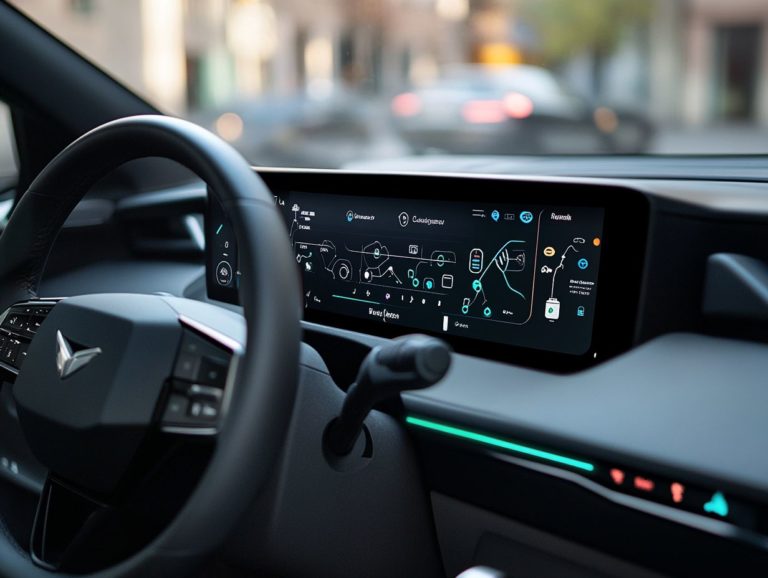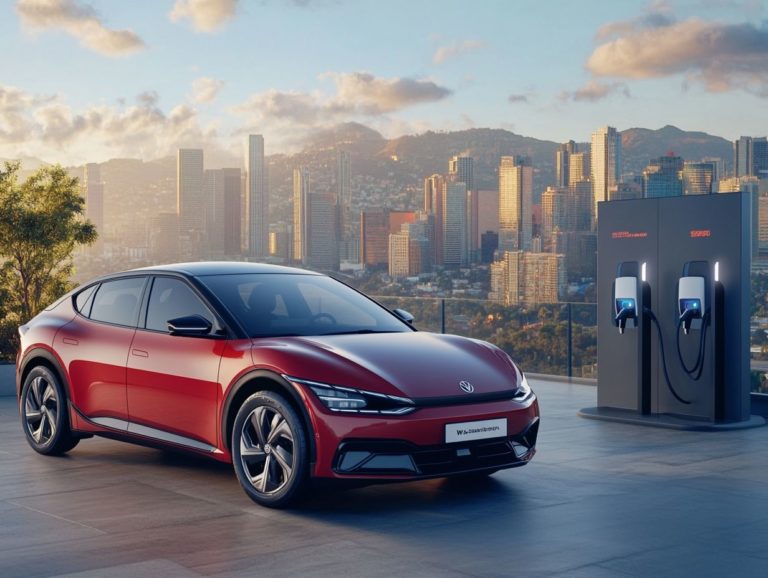How to Find the Right EV for Your Commute
Choosing the right electric vehicle (EV) can seem daunting, especially with the myriad of options at your disposal.
This guide distills the essentials, empowering you to navigate your decision with confidence. You ll start by assessing your commute needs considering factors like distance and frequency before diving into the world of various EV models. Key aspects such as range, charging options, and overall costs will be thoroughly explored.
We ll also cover safety, comfort, and your personal preferences, all to ensure you discover the perfect EV tailored to your lifestyle. Read on to unlock the knowledge you need to make a truly informed choice!
Contents
- Key Takeaways:
- Understanding Your Commute Needs
- Explore Different Types of Electric Vehicles
- Factors to Consider When Choosing an EV
- Calculating the Cost of Ownership
- Additional Features and Considerations
- Making the Final Decision
- Frequently Asked Questions
- What factors should I consider when choosing an EV for my commute?
- Is range the most important factor when selecting an EV for my commute?
- Are there any resources available to help me find the right EV for my commute?
- Can I test drive an EV before making a decision?
- What are some common misconceptions about EVs and commuting?
- Do I need to install a charging station at my home for my EV?
Key Takeaways:

- Determine your commute needs by assessing distance and frequency, as it will impact the type of electric vehicle you should choose.
- Consider factors such as range, charging options, and price when comparing different EV models to find the right one for your commute.
- Calculate the cost of ownership, including initial investment and long-term savings, before making a final decision on which EV to purchase.
Understanding Your Commute Needs
Understanding your commute needs is crucial when choosing a vehicle, particularly in today’s dynamic landscape filled with options such as electric cars, hybrids, and used EVs. With climate change becoming an urgent concern and California at the forefront of eco-friendly driving, evaluating your daily travel requirements can greatly impact your selection of a second car or a family vehicle, especially when considering the best electric vehicles for long commutes.
It’s key to understand factors like distance, frequency, and whether you may be eligible for tax credits or other incentives that could significantly influence your decision-making process.
Assessing Distance and Frequency
When you’re assessing the distance and frequency of your daily commute, it’s essential to consider your electric vehicle’s range to ease any concerns about how far you can drive on a charge, especially in today’s booming electric vehicle market.
Take the Kia EV6, for example it can deliver up to 310 miles on a single charge. This makes it an attractive option for those who tackle longer daily drives or love spontaneous weekend getaways.
On the other hand, the Nissan Leaf offers a more modest range of around 226 miles, but it still excels for urban driving and short commutes.
However, it’s not just about the numbers; the overall charging setup is crucial to your decision-making process. Locating compatible charging stations, which are places where you can recharge your vehicle’s battery, and grasping the convenience of home charging can significantly affect how frequently you choose to use your electric vehicle for various trips.
Explore Different Types of Electric Vehicles
Get ready to explore your options! The electric vehicle landscape today presents you with an impressive array of choices, including fully electric cars, hybrid cars, and plug-in hybrids, each offering distinct advantages on your journey toward zero emissions and enhanced fuel efficiency.
Consider models like the Kia EV6, Nissan Leaf, 2018 BMW i3, and 2020 Chevy Bolt, that showcase features designed just for you, whether you’re seeking a mid-market gem or a touch of luxury.
Comparing Different EV Models
When comparing different EV models like the Kia EV6 and the Nissan Leaf, you’ll uncover significant differences in battery technology and overall environmental impact. This insight gives you the power to make informed choices about eco-friendly transportation.
As you evaluate these vehicles, it’s essential to consider their unique specifications, such as battery capacity and driving range. The Kia EV6 shines with its state-of-the-art 77.4 kWh battery, delivering an impressive range of up to 300 miles on a single charge. In contrast, the Nissan Leaf, equipped with a smaller 62 kWh battery, offers around 226 miles.
Another vital aspect to keep in mind is the battery warranty; the Kia provides an extended warranty period, ensuring long-term reliability. Each model taps into the growing demand for sustainable transportation options, aligning with broader environmental goals while offering diverse price points that cater to various budgets.
Factors to Consider When Choosing an EV

When selecting an electric vehicle (EV), consider several crucial factors that influence your ownership experience.
Think about the charging options, price point, range, and battery warranty provided by manufacturers. Each of these elements plays a significant role in shaping your journey with your new vehicle.
Range, Charging Options, and Price
Range, charging options, and price are pivotal factors for a potential EV owner, directly influencing the practicality and affordability of zero-emission vehicles in today s market.
Understanding how driving range impacts your daily usability is crucial, as it dictates how often you ll need to charge and contributes to your overall convenience.
The significance of a robust public charging network cannot be overstated. It serves as essential support for those who might not have home charging solutions.
Current pricing trends in the EV market also shape your choices, making certain models more appealing than others. Consider models like the Chevrolet Bolt and Hyundai Kona Electric for their impressive electric range and affordable prices, making them especially attractive for anyone eager to embrace sustainable driving.
Calculating the Cost of Ownership
Calculating the cost of ownership for an electric vehicle requires a comprehensive understanding of both the initial investment and the long-term savings.
You should consider not only the lower fuel costs but also potential tax credits and the reduced vehicle depreciation that accompanies these eco-friendly options over time.
Initial Investment and Long-Term Savings
The initial investment in an electric vehicle can be balanced by long-term savings from fuel efficiency and reduced maintenance costs, making eco-conscious driving a realistic option.
Take models like the Tesla Model 3 and the Chevy Bolt EV, for instance; they boast impressive energy efficiency and lower running costs.
While the upfront cost might catch your eye, it’s crucial to consider significant savings on fuel electric vehicles often cost less than half to operate compared to their gasoline counterparts.
Maintenance expenses are also lower since EVs have fewer moving parts, meaning less wear and tear. Over time, these financial advantages can substantially lower your overall ownership cost, making electric vehicles not just a sustainable choice but a financially savvy one as well.
Additional Features and Considerations
When assessing electric vehicles, look beyond the core specifications. Features such as safety, comfort, and convenience play vital roles, especially for families in search of a practical and reliable family car.
Safety, Comfort, and Convenience

Safety, comfort, and convenience are at the forefront of modern electric vehicles, with safety features that help you drive better to elevate your driving experience.
Take the Tesla Model 3, for instance; it boasts cutting-edge Autopilot technology, allowing you to relax on select roads. Meanwhile, the Ford Mustang Mach-E features a 360-degree camera system, making parking and navigating tight spaces a breeze.
Beyond safety, the ergonomic designs of electric vehicles ensure a smooth ride. With spacious interiors and climate control systems, your comfort is prioritized at every turn.
Features such as remote start, over-the-air updates, and seamless smartphone integration add layers of convenience making these vehicles not only eco-friendly choices but also practical options for your daily life.
Making the Final Decision
When deciding which electric vehicle to purchase, engage in thoughtful reflection on your personal preferences and priorities. The electric vehicle market is continually evolving, presenting you with an expanding array of eco-friendly transportation options.
Taking the time to weigh these factors will ensure you make a choice that aligns perfectly with your lifestyle and values.
Start your journey towards sustainable driving today!
Personal Preferences and Priorities
Your personal preferences and priorities play a crucial role in your vehicle choice, especially as you choose eco-friendly options on your journey toward sustainable driving.
As awareness of climate change and environmental degradation grows, you likely integrate sustainability into your everyday decisions. Your choice of electric vehicle is no exception. By aligning your vehicle selection with your values, you aim to minimize your carbon footprint, which refers to the amount of pollution you create. You also gravitate toward brands that reflect your commitment to ethical practices and sustainability.
Practical aspects, such as places to charge your vehicle, vehicle range, and performance, significantly influence your considerations. Additionally, understanding how to pick the right color for your EV can enhance your choices, including family size and commuting patterns, which guide you in selecting the right electric options.
Choosing the right vehicle can feel overwhelming, but it s also exciting! This decision-making process reflects both your environmental and personal values.
Frequently Asked Questions
What factors should I consider when choosing an EV for my commute?
Think about how far you drive each day when choosing your EV! For a comprehensive approach, check out how to prepare for your first EV purchase. It’s also important to consider charging options and your budget.
Is range the most important factor when selecting an EV for my commute?

While range is important, it’s not the only factor to think about. Look at the vehicle’s efficiency and how it fits into your budget as well.
Are there any resources available to help me find the right EV for my commute?
Yes! There are many online resources and tools available to help you compare different EV models and find the one that best fits your needs.
Can I test drive an EV before making a decision?
Many dealerships offer test drives for EVs, allowing you to experience the vehicle’s performance and features before making your final decision.
What are some common misconceptions about EVs and commuting?
Some people may think that EVs have limited range or are too expensive, but many models offer longer ranges and come in various price points for commuters.
Do I need to install a charging station at my home for my EV?
This depends on your daily mileage and access to public charging stations. If you have a shorter commute and can charge at work or public stations, a home charging station may not be necessary.
Ready to find your perfect EV? Start comparing your options today!






